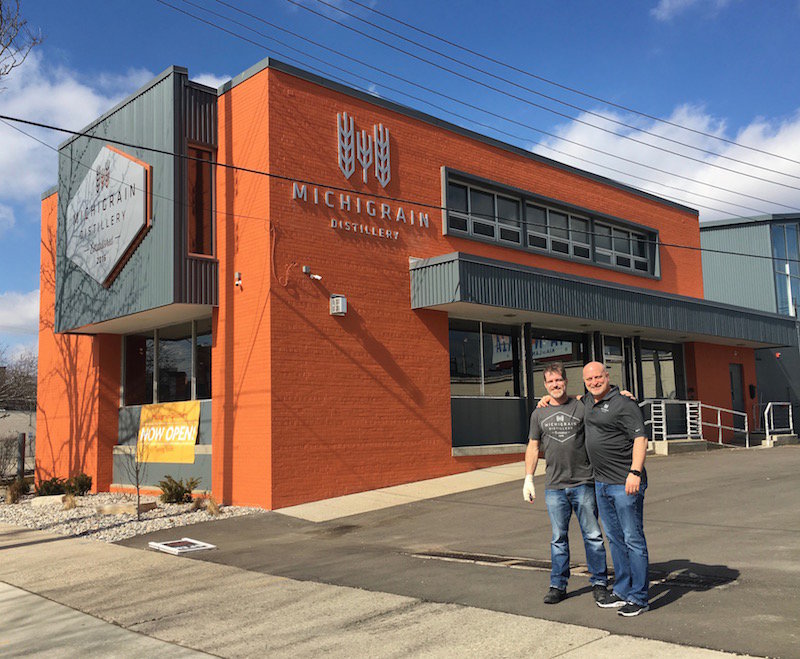
Michigan’s strength as an agricultural powerhouse has fueled a number of developments in the food and beverage industry in recent years, including the farm-to-table restaurant movement and the craft beer scene.
Last month the latest industry to take advantage of the state’s ample resources saw a new addition with the opening of Michigrain Distillery, a craft spirits manufacturing facility in downtown Lansing.
“Why go out of state when we have the best corn and wheat in the country right here in our backyard?” said Michigrain co-founder/co-owner Mike Bird. “We’re very proud of Michigan agriculture. Our grain harvest here is a river of gold.”
If Bird’s name sounds familiar, that’s because he was one of the co-founders of American Fifth Spirits, another distillery that opened in 2015 just a few blocks away. A year into running American Fifth, he ran into his old friend, Scott Ellis, a retired Lansing Police Department detective (now executive director of the Michigan Licensed Beverage Association) at a downtown event, rekindling their camaraderie and planting the seed for what would become Michigrain.
“Mike’s like an encyclopedia for distilling,” Ellis said. “Every day I work with him I learn something new, and with the amount of knowledge you need in this industry that kind of know-how is crucial. There’s no one in Michigan who’s doing what we’re doing at this level, and there are only a handful in the country.”
Michigrain’s main output is high alcohol content (HAC) spirits, a nearly colorless, odorless, tasteless liquid that serves as the base for a wide variety of liquors. Vodka is the easiest thing to make from HAC, with gin, whiskey, absinthe, port wine and flavored liqueurs (think: Bailey’s and Kahlúa) being strong secondaries. Right now the 3,500-square-foot production floor pumps out between 1,500 and 2,000 gallons of HAC per month in fourday manufacturing cycles, but Bird says that will only increase.
“Eventually I’d like to be operating 24 hours, which will really expand our capabilities,” Bird said. “The industry has grown by leaps and bounds in recent years with new technology, and I don’t see that slowing down anytime soon. We’re primed to be able to become an extremely high-volume production facility.”
Bird and Ellis dropped more than $1 million to convert the former NAPA Auto Parts Store across the street from Lansing Brewing Co. into the Michigrain headquarters. Equipment includes massive, 800-gallon stainless steel mashing tanks, a couple of polypropylene plastic fermentation tanks and a threestory-tall column that serves as the still. There’s also a bottling facility on the floor capable of producing up to 50 cases a day. But the biggest export (literally) are the 200-gallon industrial totes of HAC it ships to customers as far away as Japan.
The grain mostly comes from Jorgensen Farm Elevator in Williamston, while the potatoes that are used are actually waste product imported from Better Made Potato Chips in Detroit.
“One of my favorite things about this business is how little waste there is,” Bird said. “Almost everything, even the water we use, can be reclaimed and used for other things. It’s a highly sustainable model.”
The facility also features an elegantly decorated tasting room where customers can sample some of the HAC made in back, which are called “neutral spirits” here. There’s a full menu of cocktails made from alcohol made on-site, including the dynamite Sanguinary Mary and some specialty martinis. A second story event space will be added by this summer, featuring handmade tables made from reclaimed wood by a furniture company in Durand to match the ones on the first floor.
Liquor distilling is hardly new to the Lansing area. Red Cedar Spirits in East Lansing has been manufacturing a wide range of spirits since 1998, making it one of the oldest operations in the state. The movement gained momentum in 2014 when Sanctuary Spirits in Grand Ledge opened, followed by American Fifth Spirits the following year. So given the abundance of wheat and corn resources, why alcohol instead of, say, bread or breakfast cereal?
“It’s a social thing,” Ellis said. “My favorite thing about alcohol is that it fosters an environment of storytelling and fun. As long as it’s done responsibly, of course, and we’re all about responsible drinking.”
“And because alcohol makes my jokes funnier,” added Bird.
AFTER THE FLOOD
The waters finally receded Monday after the area’s historic floods last week, allowing business owners near the Red Cedar River in Lansing Township to begin damage assessment to their properties.
Next-door neighbors Steakhouse Philly Bar & Grill, 3020 E. Kalamazoo St., and Green Dot Stables, 410 Clippert St., each saw nearly 3 feet of water invade their restaurants, with damages for each expected to run into the hundreds of thousands of dollars. Owners of both vowed they would reopen, albeit after massive cleanup operations.
“Sorry to those I did not get back to. I was completely overwhelmed and moved today, in a lump in the throat kind of way,” wrote Charlie Semerly, co-owner of Steakhouse Philly, responding to the outpouring of support on his Facebook page. “I don’t know the extent of the damage, nor when we will reopen, but rest assured we will. Lots of work to do. We look forward to seeing you all soon.”
Nearby, Bake N’ Cakes, 3003 E. Kalamazoo St., and Oades Big Ten party story also suffered damages and will remain closed during the repair process. Stay tuned for reopening information.
Michigrain Distillery
523 E. Shiawassee St., Lansing 4 p.m.-midnight Tuesday-Friday; noonmidnight Saturday; noon-8 p.m. Sunday; closed Monday (517) 220-0560, michigrain.net
Support City Pulse - Donate Today!
Comments
No comments on this item Please log in to comment by clicking here